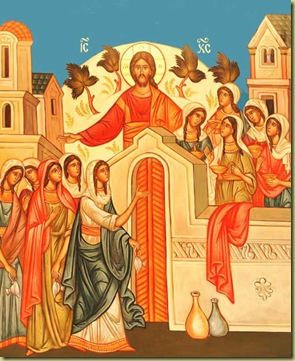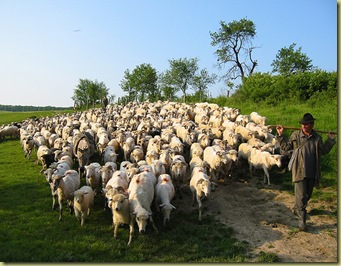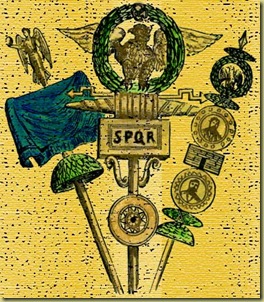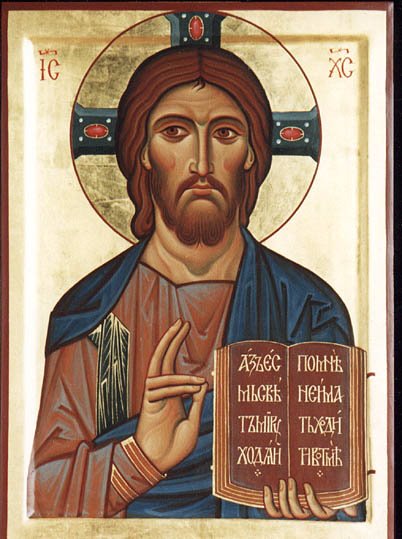Matthew 25:1-13; 1 Thessalonians 5:1-11; Isaiah 65:17-25
In the Name of the Father and of the + Son and of the Holy Spirit.
Each year, on the Last Sunday of the Church Year, you hear today’s lesson from the Gospel according to St. Matthew – Jesus’ parable of the Wise and Foolish Virgins. Though there are many interesting points of discussion and many layers of meaning in this parable, truth be told, there are only two things that you really want to know: “What is the oil?” And, “Where do I get it?”
That Jesus prefaces this parable by saying that it describes the kingdom of heaven, and that the protagonists in the story are virgins, waiting for the coming of the Bridegroom, this indicates to you that this parable is told to the Church, to the body and to the Bride of Christ, and that the virgins are, in fact, you, His faithful Christians. All ten virgins believe in the Bridegroom and trust that He is coming as He has promised. They have their lamps, lit and ablaze with the light of faith, and they wait, patiently, for the Bridegroom to come. However, this is when the crux arises: The Bridegroom is delayed, and as they patiently and faithfully wait and watch for Him to come, the virgins become sleepy, and all ten of them fall asleep.
Now, to this point there has been shown to be no difference between the virgins – all are forgiven by grace through faith, all are robed in the whiteness of baptismal righteousness, all are filled with faith, burning and shining with the light of faith. But, five of the virgins brought extra oil with them, and five did not. This fact hardly mattered when the Bridegroom’s arrival seemed to be imminent; however, now that He has become delayed, there is a crux, a crisis – literally, a crisis of faith. Yes, the answer to the first question, “What is the oil?” is faith – the oil in the lamps, and the oil in reserve, is faith: faith in the Bridegroom, faith in His promised coming. What distinguished the five wise virgins from the five foolish virgins was not that the wise were somehow better Christians than the foolish, or more faithful – remember, all ten of them fell asleep – but the five wise virgins had oil, they had faith to spare, to keep their lamps burning even through the delay of the Bridegroom.
Now, I know that your reason wants to credit the wise virgins for their having a surplus of oil, and that you are tempted to think of them as better or more faithful than their foolish companions, however, Jesus’ teaching will not permit this. For, oil, like faith, is not something that you have naturally, or that you can choose or develop on your own, but you must purchase oil from a dealer, that is to say that you must receive faith, not from within you, but from outside of you. Faith is a gift; it has to be given to you, sown within you, created within you ex nihilo, out of the nothingness of your soul in sin and death. Only if the Lord sows faith in you is there hope that it will grow; only if the Lord, by His Holy Spirit fills you with the oil of faith, not once, but again and again throughout your life, will you have oil sufficient to wait and to watch for the coming of the Bridegroom whenever He may come.
And, when the Bridegroom arrived, at an unknown day and hour, the wise virgins with their extra oil entered into the marriage feast, while the foolish virgins – whose lamps were going out and who realized that they could not produce for themselves the oil of faith – pleaded for the wise to give them some of their oil. But, of course, that is impossible, for no one can believe for another. This is why you confess in the Creed “I believe”, and not “We believe”. Indeed, we may, and we do, believe and confess together the same faith; nevertheless, each of you, dear Christians, must believe and confess for yourself. You must have the oil of faith within you. Therefore, the wise virgins had to reply to the foolish, “Since there will not be enough for us and for you, go rather to the dealers and buy for yourselves.” And while they were going to buy, the bridegroom came, and those who were ready went in with Him to the marriage feast, and the door was shut. “What is the oil?” The oil is faith. “Where do you get it?” That is the question we must answer next.
Jesus uses the language of commerce – “Go rather to the dealers and buy for yourselves.” But, you cannot buy faith, can you? No, of course you cannot. Therefore, you should consider some other instances in which the Prophets and our Lord Jesus used similar language of commerce in regard to things you cannot buy. For example, from the Prophet Isaiah: “Come, everyone who thirsts, come to the waters; and he who has no money, come, buy and eat! Come, buy wine and milk without money and without price.” Jesus repeats the same in the Gospel According to St. John, and then again in the Revelation saying, “let the one who is thirsty come; let the one who desires take the water of life without price.” Your Lord Jesus invites you to come and buy faith, eternal life, and salvation without cost and without price, for He has paid the price in full for you and for all men, “not with gold or silver, but with His holy, precious blood and with His innocent suffering and death.”
It should be clear by now who and where “the dealers” are: The dealers of the oil of faith are those servants of the Lord whom He has set apart to give to you, free and without cost, the gifts that your Lord Jesus purchased for you at great cost – forgiveness, eternal life, and salvation. You will find them where Christ has promised to be, wherever two or three are gathered in His Name around His faith creating and sustaining gifts of Word and Sacrament. Here, in this place, through these humble means, Christ your Lord creates faith ex nihilo, out of nothing, in the hearts of sinful men by the power of His Holy Spirit through His proclaimed Gospel Word and the washing of Holy Baptism. Here, in this place, He nourishes, feeds, strengthens, and keeps the light of faith burning brightly by replenishing the oil of faith in you as you confess your sins and receive His absolution, hear His Word and inwardly digest it, eat His body and drink His blood and commune in Him, and He in you. When God made you a Christian, He gave you a new life. Yes, you were born again, but your spiritual rebirth was no more by your will, reason, power, or choice than was your natural birth. God alone creates something out of nothing. God alone raises the dead to life. God alone creates and sustains faith in the hearts and souls of men conceived and born in sin, meriting only death.
The Church of Jesus Christ is the place where Christians come to replenish their faith so that they may continue to wait and watch in patient perseverance for the coming of the Lord. And, despite Her warts and wrinkles, the fact that She is composed entirely of sinful and hypocritical men, the Church is the holy and virgin womb in which faith is conceived and the children of God are born. She is bosom of Abraham from whence God’s children are suckled and nourished. That is why the Divine Liturgy is something that we must take great care to preserve and to keep and to do properly. That is why, no matter what the world throws at the Church and Her Christians, no matter what else our failings and foibles might be, Jesus Christ will be present amongst us with His Words and with His Wounds just as He has promised. And, blessed are you when you are humbled to see the Church and Her worship, not as something that you are compelled to endure, but the very location and means of your receiving the one thing needful – faith, which receives all the gifts and blessings of the Bridegroom Jesus Christ.
Still, there is another aspect of Jesus’ Parable of the Wise and Foolish Virgins that you must consider: When the foolish virgins returned from their search for more oil, they found the door to the marriage feast shut. They cried out to the Lord saying, “Lord, lord, open to us.” But He answered, “Truly, I say to you, I do not know you.” Hours ago, these were His holy virgins, waiting in faith for His coming, but now He says that He does not know them! Such harsh words from your Lord should cause you to wrestle with them to determine their meaning and how this can be, what has changed. This much is certain, what has not changed is the Bridegroom. Your Lord Jesus has paid for the salvation of all people, without exception, regardless of their faith. When He died on the cross, it was finished, for everyone. That truth will never change – thanks be to God for His grace and His mercy! Moreover, His Holy Spirit creates faith when and where He pleases, as a sower sows his seed, in hearts and souls that do not refuse Him. That is to say, His grace is not irresistible, and it is not true that we are “once saved, always saved”. Men who once believed can fall into unbelief. Faith that is not nourished, kept, and replenished will grow weak and die. That is precisely what occurred with the five foolish virgins. They neglected their faith; perhaps they took it for granted. They did not nourish it and keep it full and aflame, but they permitted it to slowly fade away, diminish, and burn out. Then, the Bridegroom came, at a day and an hour no one could know, and it was not that they fell asleep that caused them to be outside the gates, but it was that their faith had grown weak and had died. The Bridegroom Jesus pronounced the judgment that they had chosen for themselves, “I do not know you.” I loved you with my Father’s love; I did everything that was necessary to make you right with Him; I died for you and shed my blood for you that you could live; but you have rejected me. I knew you once, but now, I do not recognize what stands before me. You were flesh of my flesh and bone of my bone, but now you are something else, something other.
“But you are not in darkness, brothers, for that day to surprise you like a thief. For you are all children of light, children of the day. We are not of the night or of the darkness. So then let us not sleep, as others do, but let us keep awake and be sober. […] For God has not destined us for wrath, but to obtain salvation through our Lord Jesus Christ, who died for us so that whether we are awake or asleep we might live with Him.” Whether we are awake or asleep, that is not the issue, for it is not what we do that matters, but it is what Christ has done. You cannot buy it, choose it, reason it, or merit it, but salvation by grace through faith in Christ Jesus is yours at no cost, right here, and right now. A foretaste of the marriage feast to come is here for you now that you may be well prepared, having sufficient oil of faith, whenever the Bridegroom should appear. The feast is prepared; “Come, everyone who thirsts, come to the waters; and he who has no money, come, buy and eat! Come, buy wine and milk without money and without price.”
In the + Name of Jesus. Amen.






